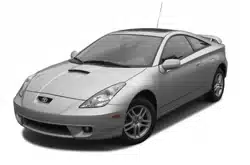Loading ...
Loading ...
Loading ...

’04MY CELICA U (L/O 0308)
174
2004 CELICA from Aug. ’03 Prod. (OM20823U)
If your engine coolant temperature
gauge indicates overheating, if you ex-
perience a loss of power, or if you hear
a loud knocking or pinging noise, the
engine has probably overheated. You
should follow this procedure...
1. Pull safely off the road, stop the ve-
hicle and turn on your emergency
flashers. Put the transmission in “P”
(automatic) or neutral (manual) and ap-
ply the parking brake. Turn off the air
conditioning if it is being used.
2. If coolant or steam is boiling out of the
radiator or reservoir, stop the engine.
Wait until the steam subsides before
opening the hood. If there is no coolant
boiling over or steam, leave the engine
running and make sure the electric
cooling fan is operating. If it is not,
turn the ignition off.
CAUTION
To help avoid personal injury, keep
the hood closed until there is no
steam. Escaping steam or coolant is
a sign of very high pressure.
3. Look for obvious coolant leaks from the
radiator, hoses, and under the vehicle.
However, note that water draining from
the air conditioning is normal if it has
been used.
CAUTION
When the engine is running, keep
hands and clothing away from the
moving fan and engine drive belts.
4. If the coolant is leaking, stop the en-
gine immediately. Call a Toyota dealer
for assistance.
5. If there are no obvious leaks, check
the coolant reservoir.
If it is dry, call a Toyota dealer for
assistance as soon as possible.
If there is enough coolant in the reser-
voir, again check the coolant level in
the reservoir after the engine coolant
temperature has cooled to normal. Seri-
ous coolant loss indicates a leak in the
system. You should have it checked as
soon as possible at you Toyota dealer.
CAUTION
Do not attempt to touch the coolant
reservoir tank when the engine and
radiator are hot. Serious injury could
result from scalding hot fluid and
steam blown out under pressure.
If your vehicle overheats
Loading ...
Loading ...
Loading ...
